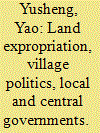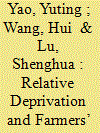|
|
|
Sort Order |
|
|
|
Items / Page
|
|
|
|
|
|
|
| Srl | Item |
| 1 |
ID:
097447


|
|
|
| 2 |
ID:
163117


|
|
|
|
|
| Summary/Abstract |
This study examines the political development in a well-off, industrialised village of Zhejiang province from 1996 to 2015. It illustrates how urbanisation impacted village politics: the rise in the village's land values, the entrance of outside players to village politics and how the villagers' demands to participate in land expropriation posed an unprecedented challenge to the village leadership and the fledgling democracy. The village's increasing resources also drew the village's economic elite into intense electoral competition. The three elections in which they offered bribes undermined the quality of the elections and governance, as well as villagers' political rights and economic interests. In addition to the village leaders and economic elite, this study identifies the local governments, particularly the town government, as being responsible for the deterioration of the village's elections and governance. While holding the central government accountable for local governments' abuse of "land finance", this study also found that the central government played a positive role in improving village's elections and governance.
|
|
|
|
|
|
|
|
|
|
|
|
|
|
|
|
| 3 |
ID:
079066


|
|
|
|
|
| Publication |
2007.
|
| Summary/Abstract |
This paper explores a new compensation standard for use in agricultural land conversion in China during the land-expropriation process, based on the market value definition. Assuming identical bargaining power between the buyer and the seller, efficient and equitable compensation is obtained through a market transaction and bargaining negotiation mechanism, under the assumpation of a perfect market. From the state-of-the-art viewpoint of land appraising, a practical approximation of the theoretical optimal compensation will provide an effective solution for China, under the current collective-owned land property rights structure
|
|
|
|
|
|
|
|
|
|
|
|
|
|
|
|
| 4 |
ID:
190410


|
|
|
|
|
| Summary/Abstract |
Using a detailed case study of house eviction in peri-urban China as well as original data from an online survey experiment, this article explores the opportunistic bargaining phenomenon in China in which citizens leverage the policy priorities of authorities with tactics that are not approved by the state to bargain for goals beyond those promised by the state. We find that opportunistic bargaining is widely accepted by Chinese citizens and that such an inclination is encouraged by successful precedents and clear signals of an opening through which to leverage government policy priorities; however, it is dampened by unclear signals and failed precedents. We also find that opportunistic bargainers tend to hold more negative perceptions of the current regime and are less likely to abide by state rules or social norms. The characteristics of opportunistic bargaining appear to be the opposite of the dominant “rightful resistance” framework.
|
|
|
|
|
|
|
|
|
|
|
|
|
|
|
|
| 5 |
ID:
181880


|
|
|
|
|
| Summary/Abstract |
Land expropriation is a common source of grievances and resistance from farmers in China. Based on survey data, we propose that farmers’ sense of relative deprivation is one of the causes. Our study focuses on compensation distribution in villages, where village collectives are the reference for comparison. Relative deprivation is measured by the ratio of farmer compensation to the standard government compensation; the gap between these is roughly the compensation retained by village collectives. The outcome variable is farmers’ willingness to participate in village governance. The empirical test is based on 2017 data from the Chinese Family Database of Zhejiang University and compensation standards data collected by the authors. Nearly 75% of respondents received less than standard compensation, which indicates widespread relative deprivation. And the greater the relative deprivation of farmers, the more willing they are to participate in village governance.
|
|
|
|
|
|
|
|
|
|
|
|
|
|
|
|
| 6 |
ID:
186943


|
|
|
|
|
| Summary/Abstract |
Land expropriation, where peasants’ property rights are encroached by the state, has been recognized as a primary source of social dissension in rural China. Since the end of the last century, the Administrative Litigation Law (ALL) has provided people with a legal weapon to defend themselves against violations by state power. Drawing on the theory of relative deprivation, this paper proposes that peasants are more likely to sue the state when they feel deprived. To examine this hypothesis, we first present a case study to depict the causal process and then use quantitative research to improve the external validity of our findings. We created a novel and unique database of prefecture-level administrative litigations and relative deprivation for Poisson regression analysis. The quantitative results prove that the more peasants feel relatively deprived, the more likely they are to sue the state. Furthermore, the positive effect of relative deprivation on administrative litigations has become more significant over time, implying peasants’ growing awareness of legal resistance. This paper concludes that a critical step towards eliminating social inequity and maintaining social stability in rural China is to reduce the relative deprivation of peasants by, for example, allowing them to share in land value appreciation in the process of urbanization.
|
|
|
|
|
|
|
|
|
|
|
|
|
|
|
|
|
|
|
|
|